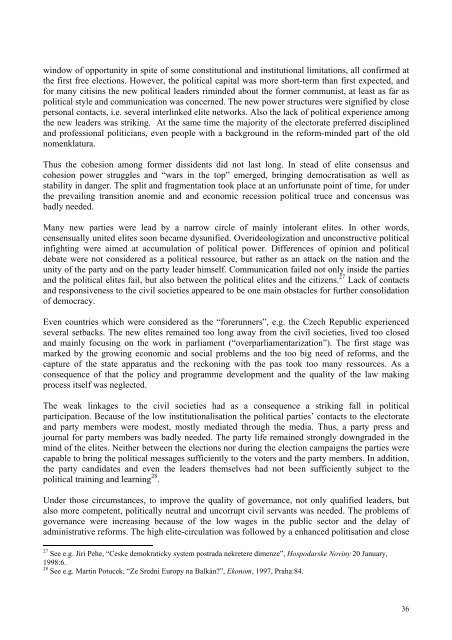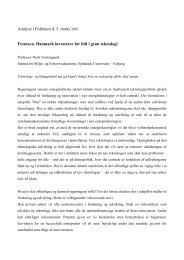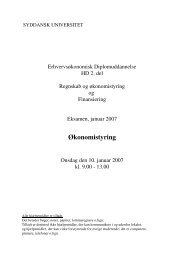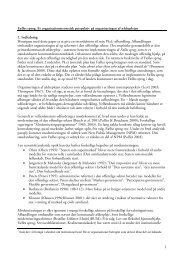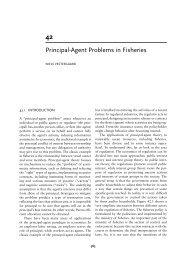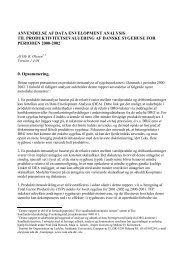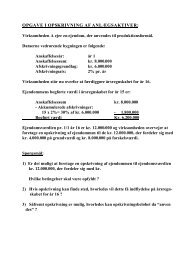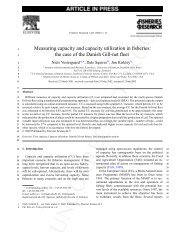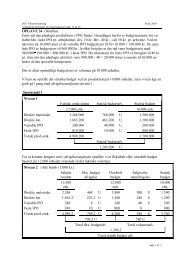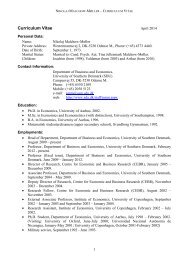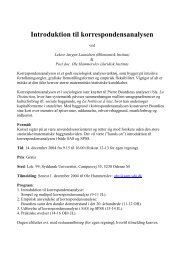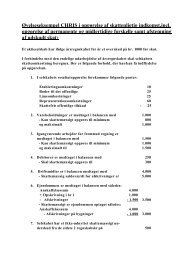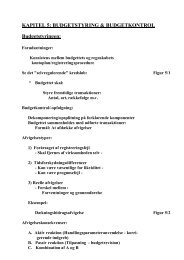Development of Parties and Party Systems in ... - lah@sam.sdu.dk
Development of Parties and Party Systems in ... - lah@sam.sdu.dk
Development of Parties and Party Systems in ... - lah@sam.sdu.dk
- No tags were found...
Create successful ePaper yourself
Turn your PDF publications into a flip-book with our unique Google optimized e-Paper software.
w<strong>in</strong>dow <strong>of</strong> opportunity <strong>in</strong> spite <strong>of</strong> some constitutional <strong>and</strong> <strong>in</strong>stitutional limitations, all confirmed atthe first free elections. However, the political capital was more short-term than first expected, <strong>and</strong>for many citis<strong>in</strong>s the new political leaders rim<strong>in</strong>ded about the former communist, at least as far aspolitical style <strong>and</strong> communication was concerned. The new power structures were signified by closepersonal contacts, i.e. several <strong>in</strong>terl<strong>in</strong>ked elite networks. Also the lack <strong>of</strong> political experience amongthe new leaders was strik<strong>in</strong>g. At the same time the majority <strong>of</strong> the electorate preferred discipl<strong>in</strong>ed<strong>and</strong> pr<strong>of</strong>essional politicians, even people with a background <strong>in</strong> the reform-m<strong>in</strong>ded part <strong>of</strong> the oldnomenklatura.Thus the cohesion among former dissidents did not last long. In stead <strong>of</strong> elite consensus <strong>and</strong>cohesion power struggles <strong>and</strong> “wars <strong>in</strong> the top” emerged, br<strong>in</strong>g<strong>in</strong>g democratisation as well asstability <strong>in</strong> danger. The split <strong>and</strong> fragmentation took place at an unfortunate po<strong>in</strong>t <strong>of</strong> time, for underthe prevail<strong>in</strong>g transition anomie <strong>and</strong> <strong>and</strong> economic recession political truce <strong>and</strong> concensus wasbadly needed.Many new parties were lead by a narrow circle <strong>of</strong> ma<strong>in</strong>ly <strong>in</strong>tolerant elites. In other words,censensually united elites soon became dysunified. Overideologization <strong>and</strong> unconstructive political<strong>in</strong>fight<strong>in</strong>g were aimed at accumulation <strong>of</strong> political power. Differences <strong>of</strong> op<strong>in</strong>ion <strong>and</strong> politicaldebate were not considered as a political ressource, but rather as an attack on the nation <strong>and</strong> theunity <strong>of</strong> the party <strong>and</strong> on the party leader himself. Communication failed not only <strong>in</strong>side the parties<strong>and</strong> the political elites fail, but also between the political elites <strong>and</strong> the citizens. 27 Lack <strong>of</strong> contacts<strong>and</strong> responsiveness to the civil societies appeared to be one ma<strong>in</strong> obstacles for further consolidation<strong>of</strong> democracy.Even countries which were considered as the “forerunners”, e.g. the Czech Republic experiencedseveral setbacks. The new elites rema<strong>in</strong>ed too long away from the civil societies, lived too closed<strong>and</strong> ma<strong>in</strong>ly focus<strong>in</strong>g on the work <strong>in</strong> parliament (“overparliamentarization”). The first stage wasmarked by the grow<strong>in</strong>g economic <strong>and</strong> social problems <strong>and</strong> the too big need <strong>of</strong> reforms, <strong>and</strong> thecapture <strong>of</strong> the state apparatus <strong>and</strong> the reckon<strong>in</strong>g with the pas took too many ressources. As aconsequence <strong>of</strong> that the policy <strong>and</strong> programme development <strong>and</strong> the quality <strong>of</strong> the law mak<strong>in</strong>gprocess itself was neglected.The weak l<strong>in</strong>kages to the civil societies had as a consequence a strik<strong>in</strong>g fall <strong>in</strong> politicalparticipation. Because <strong>of</strong> the low <strong>in</strong>stitutionalisation the political parties’ contacts to the electorate<strong>and</strong> party members were modest, mostly mediated through the media. Thus, a party press <strong>and</strong>journal for party members was badly needed. The party life rema<strong>in</strong>ed strongly downgraded <strong>in</strong> them<strong>in</strong>d <strong>of</strong> the elites. Neither between the elections nor dur<strong>in</strong>g the election campaigns the parties werecapable to br<strong>in</strong>g the political messages sufficiently to the voters <strong>and</strong> the party members. In addition,the party c<strong>and</strong>idates <strong>and</strong> even the leaders themselves had not been sufficiently subject to thepolitical tra<strong>in</strong><strong>in</strong>g <strong>and</strong> learn<strong>in</strong>g 28 .Under those circumstances, to improve the quality <strong>of</strong> governance, not only qualified leaders, butalso more competent, politically neutral <strong>and</strong> uncorrupt civil servants was needed. The problems <strong>of</strong>governance were <strong>in</strong>creas<strong>in</strong>g because <strong>of</strong> the low wages <strong>in</strong> the public sector <strong>and</strong> the delay <strong>of</strong>adm<strong>in</strong>istrative reforms. The high elite-circulation was followed by a enhanced politisation <strong>and</strong> close27 See e.g. Jiri Pehe, “Ceske demokraticky system postrada nekretere dimenze”, Hospodarske Nov<strong>in</strong>y 20 January,1998:6.28 See e.g. Mart<strong>in</strong> Potucek, “Ze Sredni Europy na Balkán?”, Ekonom, 1997, Praha:84.36


